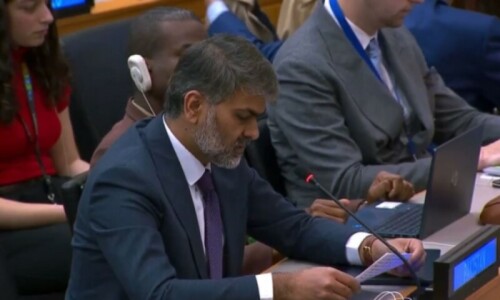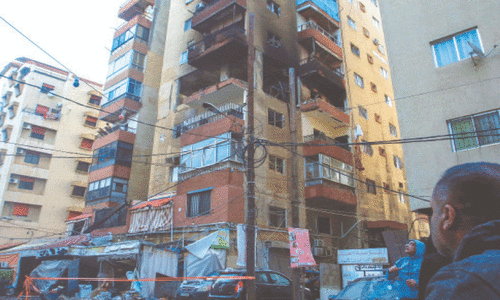The recently reopened Faletti’s has a history so rich that it could furnish material for an entire book. Perhaps the oldest hotel in Pakistan, it has been home to numerous dignitaries being the only hotel of its calibre up until the ’70s. The dignitaries may be no more but the hotel boasts a number of suites by their name.
First established in 1880 this colonial boutique hotel, now under a new private ownership, has been extensively renovated. Its colonial essence with its original façade has been restored, not to mention its ballroom — complete with wooden panelling, high roofs and orchestra space.
Along with restoration, the hotel management has resolved to keep under its wings some old employees despite their age or ability to work, and look after their health and financial needs. These ex-employees have many stories to tell, some of which were passed down to them by their seniors. One such anecdote revolves around the massive ancient tree that occupies a prime spot in the hotel premises. According to popular belief Guru Nanak would sit under it everyday to have his lunch. The hotel grounds have 68 trees that are hundreds of years old.
Faletti’s was one of four hotels owned by the affluent Italian hotelier Giovanni Faletti, the other three being Deans, Cecil’s in Murree and Flashman’s Hotel in Rawalpindi. It is said that Faletti had been asked not to chop down any of the ancient trees on the premises as they had historical significance, but it was an advice he did not heed, and chopped down a few trees; after which his economic downfall began. It is more a popular belief that given to extravagance and lavish living, Faletti eventually ran into debt, and in order to pay it off sold the hotel’s shares.
According to tales recounted by old hotel employees, Faletti’s Hindu clerk, Oberoi, offered to buy some shares, and Faletti was so impressed and delighted that someone whose job was to haul coal for the rooms had saved enough to buy the shares of his hotel that he allowed him to become his trusted employee. When Faletti finally left Pakistan he gifted Oberoi all his hotels on the condition that he would not change the name of Faletti’s. Oberoi stayed true to his word and earned so much from just Faletti’s alone that he invested in a hotel in Delhi, the famous Oberoi, following which he established more hotels in India. Interestingly enough Faletti’s son later came to Pakistan and served as a manager under Oberoi, who showed him the utmost respect as the son of his ex-boss.
After the 1965 war, Oberoi decided to move to India and sold majority shares of the hotel to PTDC — again on the condition that the hotel name would not be changed.
The government owned the hotel till June 2004 during which time it functioned more as office facilities with an occasional event being held on and off on the premises, and under the privatisation commission opened bids on the hotel a number of times. It was finally privatised on July 1, 2004 and handed over two years later to a UAE-based company, again on the condition that the name of the hotel would not be changed and that its ethos would be preserved. It remained closed till December 2012, for massive renovation work. A soft opening of the newly restored hotel took place last year on January 1, while the hotel became fully operational from June 2013. It is indeed praiseworthy that in a country where its tangible heritage is plundered with impunity and where even the home of the Quaid has not been preserved for posterity, Faletti’s owners have all been mindful of preserving the hotel’s history and not just its name.
The Ava Gardener suite is named after the famous Hollywood star who stayed there for three months while Bhowany Junction was being shot in Lahore in 1955. There is also a Quaid-i-Azam suite, where Jinnah had stayed in 1929 when he was pleading the Ghazi Ilm-ud-din Shaheed case at the Lahore High Court. Justice Cornelius the fourth chief justice of Pakistan had also made the hotel his home, from before Partition and lived in one of its suites for more than 45 years — now of course, named after him — where his wife and later he, passed away. Among other notable guests of the hotel were Pandit Nehru, Stewart Granger, Raj Kapoor, Allama Iqbal, Zulfiqar Ali Bhutto, Mohammed Rafi, Dilip Kumar and Marlon Brando. The last had also held a press conference in his hotel suite and had played a piano which the management plans to restore and display soon.
Of course, just ambience and history is not enough for a hotel to survive in this competitive age where five-star hotels have an edge over boutique property in that they offer far more facilities to today’s fastidious client. Aware that they must improve the range of their offerings, Faletti’s now plans to construct a new wing on its scattered area of nearly 68 kanals which currently offers only 44 rooms (all suites but of different sizes). The new wing with around 700 to 800 rooms would connect with the old one and will offer swimming, gym, jacuzzi, sauna and other facilities.
A new Lebanese restaurant will open soon, while a few other niche restaurants — Italian and Mexican franchises — are in the pipeline. Boasting the largest banquet facility in any hotel in the country — it occupies the grounds where the staff quarters once stood — Faletti’s now also has a beautiful mosque on two canals recently constructed by its owners.
Once the extensions are complete, this protected property under the Punjab Special Premises Act promises to be not just a hotel with a rich history and heritage but also one that offers facilities at par with its five-star contemporaries.



















































